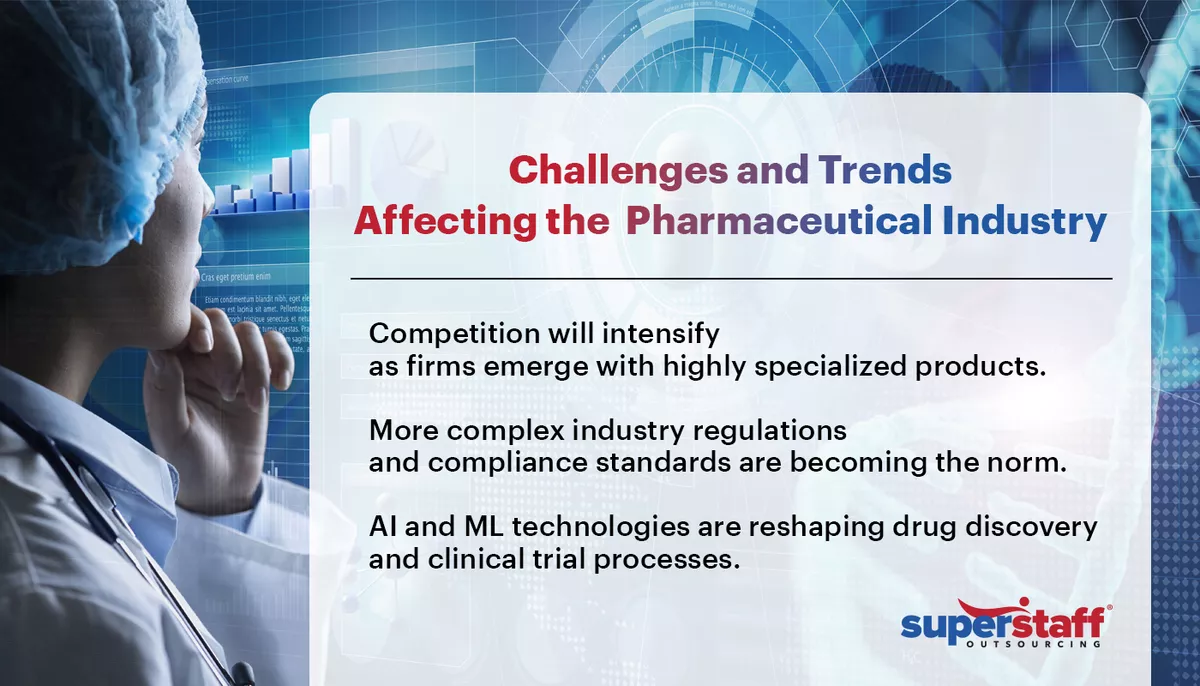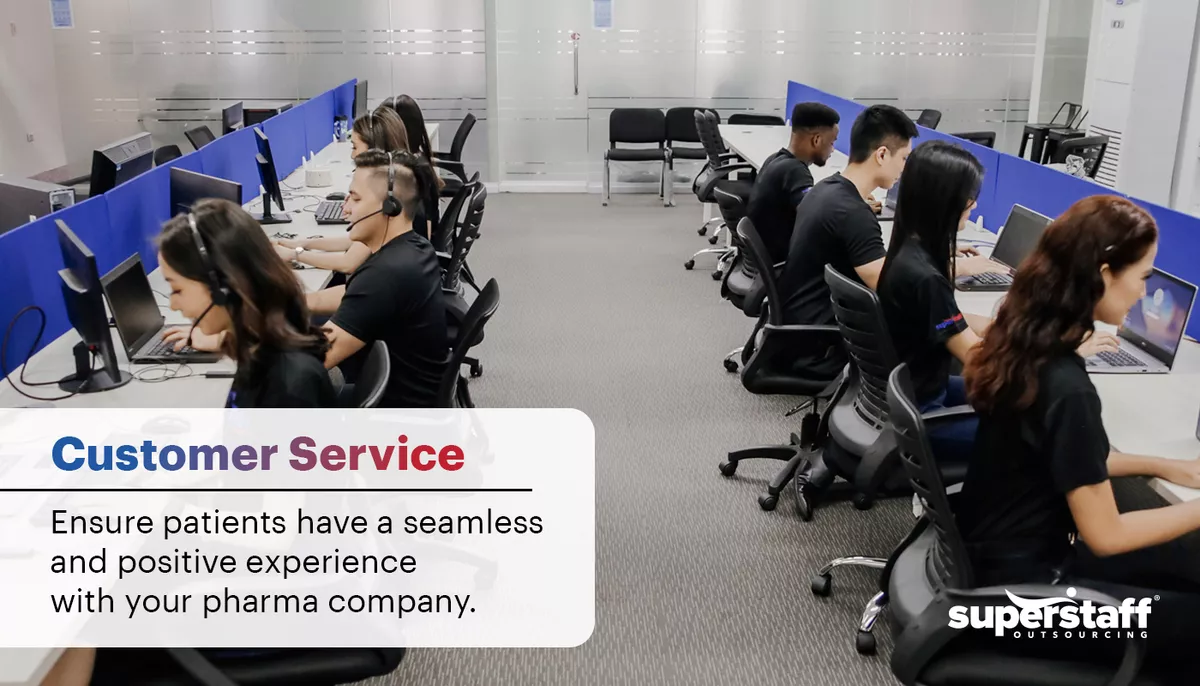
The pharmaceutical sector is navigating many challenges, from the ripple effects of COVID-19 to ongoing supply chain disruptions. In the past, industry leaders did not view operations strategy as a top priority, but this is quickly changing.
Pharma companies are realizing the importance of a carefully crafted and well-executed long-term operational plan amid a constantly evolving landscape. They must now reassess and reconsider their sourcing and manufacturing choices to future-proof operations in the shifting healthcare ecosystem.
In the wake of global disruption, outsourcing pharma non-clinical functions has emerged as a powerful tool for ensuring industry adaptability, efficiency, and resilience. By leveraging the strengths of their BPO partners, firms can position themselves for success, adapt to challenges, and readily embrace new opportunities.
A Look Into the Shifting Pharmaceutical Industry Landscape

Increased Competition and Evolving Market Dynamics
Today’s pharmaceutical firms face intense competition from traditional players and new entrants. The rise of generic and biosimilar products has created pricing pressures, eroding the revenue of established blockbuster drugs.
Simultaneously, smaller, more agile companies are leveraging niche expertise to develop innovative therapies that cater to specific patient populations. This intensification of competition underscores the need for pharmaceutical companies to differentiate themselves through novel products and approaches.
Firms must pay constant attention to their competitors’ strategies to get ahead. Industry leaders regularly reassess their practices, address deficiencies, and seize short- and long-term opportunities.
Regulatory Complexities and Compliance Standards
The nature of the pharmaceutical sector warrants that all products, systems, and processes are highly regulated. Complying with these regulations, which include everything from manufacturing processes to labeling guidelines, is critical for ensuring that all products or drugs developed pass quality and safety requirements.
Regulatory complexities have grown substantially, with stringent guidelines and compliance standards becoming the norm. The approval process for new drugs has become more rigorous, necessitating comprehensive clinical trials and robust safety data.
Beyond industry regulations, pharma companies must stay updated on state-specific laws to avoid penalties and build trust with authorities and patients. Prescription drug monitoring programs (PDMP), the Drug Transparency in Medicaid Act, and drug take-back legislations are among the laws and regulations firms must consider.
Moreover, the evolving landscape of data privacy and intellectual property rights adds complexity to product development and commercialization. Navigating this regulatory maze requires a strategic and informed approach to ensure timely market access.
Technological Advancements and Digital Disruption
In today’s digitalized world, businesses of all industries must embrace new technologies to remain competitive–and the pharmaceutical sector is no exception.
Technological advancements and innovations are reshaping how pharmaceutical companies conduct research, develop new products, and interact with patients. Artificial intelligence (AI) and machine learning (ML) tools accelerate drug discovery processes, enabling predictive modeling for clinical trials and facilitating personalized medicine.
Moreover, digital platforms transform patient engagement, enabling remote monitoring, telemedicine, and real-world evidence generation. Firms that embrace digital innovation are poised to gain a competitive edge in this tech-driven era.
The challenge for many pharma companies is finding qualified workers equipped to handle and deploy these new technologies. They must also invest in sound data infrastructure to maximize the potential of any AI and ML software. Otherwise, they risk making inaccurate predictions or faulty decisions due to obsolete or mismanaged data.
Top 5 Non-Clinical Functions When Outsourcing Pharma Services

What do pharma companies outsource to BPO partners? One of the most common (yet critical) non-clinical functions they can delegate to a third-party provider is customer support.
Good customer service is essential for any company, particularly pharmaceutical firms. According to Forbes, 86% of consumers don’t mind paying more for an exceptional experience. When patients have positive associations with a particular drug and a specific pharmacy, they’re likely to return the next time they need medication.
Satisfied customers are likely to recommend a pharma company’s products and services to their family and friends. Positive word-of-mouth can improve brand awareness and create more loyal customers.
Why Outsource Customer Support?
Working with a call center allows companies to focus on their core competencies, such as drug research, development, and marketing, while leaving customer support tasks to specialized experts. BPO firms have trained professionals who can handle all customer inquiries, including those related to pharmaceutical products.
During peak periods or product launches, the demand for customer support may increase significantly. Outsourcing allows pharmaceutical companies to scale their customer service operations based on fluctuating demand.
Additionally, global pharmaceutical companies may require customer support in multiple languages. The right call center can provide access to multilingual support teams, ensuring effective communication with customers from different countries and regions.
Accounting and Bookkeeping

All businesses depend on proper accounting to manage resources and ensure financial health. Still, accounting is particularly critical for pharma companies because of the industry’s complex tax and financial regulations.
Pharmaceutical firms can outsource financial services to a reliable BPO partner to avoid wasting resources and dealing with tax compliance issues.
Outsourced accounting and bookkeeping professionals are experts in financial management. They are skilled, certified public accountants (CPAs) with expertise in pharmaceutical industry accounting, ensuring accurate financial records and compliance with relevant regulations.
Reputable outsourcing firms typically utilize advanced accounting software and technologies that may be too costly for small to mid-sized pharmaceutical companies to implement in-house.
Data Science

We live in the digital age, where it has become easier than ever for businesses to access and collect consumer data. The pharmaceutical industry benefits significantly from this.
By harnessing the power of data, pharma companies can expedite drug development, enhance personalized medicine approaches, and make informed decisions that drive innovation and market success.
The problem is that much of the data accumulated by businesses (80% to 90%) is unstructured. Before making any decisions, pharmacies must work with qualified data scientists and analysts to extract valuable and actionable insights from raw information.
Working with outsourced data science professionals empowers pharmaceutical companies to tap into specialized analytical capabilities and technologies. Industry experts predict that pharma companies will continue increasing their data analytics spending to $1.2 billion by 2030, rising by 27% compared to previous years.
Embracing the potential of data science outsourcing positions, pharmaceutical companies are at the forefront of the data revolution, unlocking hidden opportunities and shaping the future of healthcare.
Recruitment and Human Resources

In the ever-evolving pharmaceutical industry, talent acquisition is a critical driver of success. However, widespread labor shortages and talent retention problems can significantly hinder a company’s growth. According to a McKinsey study, 40% of workers plan to leave their jobs soon, potentially disrupting many pharmaceutical firms’ daily operations.
To address these challenges, industry players are turning to recruitment process outsourcing. Working with an RPO provider enables companies to access specialized expertise, accelerate innovation, and respond to changing demands with agility.
By collaborating with outsourcing partners, pharmacies can easily find and hire workers who can take on specialized or niche roles. As such, they can remain at the forefront of scientific and technological advancements, ensuring sustainable growth and competitiveness in a dynamic landscape.
Supply Chain Management

Pharmaceutical manufacturing organizations seek innovative solutions to improve supply chain resilience amid a volatile international trade environment.
Thankfully, outsourcing supply chain and logistics management is an excellent way to enhance flexibility and agility amid global disruptions. It empowers pharmaceutical companies to improve efficiency, respond promptly to market demands, and allocate resources more effectively.
As the pharmaceutical landscape evolves, companies that embrace outsourcing as part of their comprehensive supply chain strategy are set to thrive in a rapidly changing industry. Leveraging the expertise of specialized partners and capitalizing on their optimized infrastructure can lead to faster production and reduced costs.
The Role of Pharma Outsourcing Jobs in the Future of the Industry
From customer service to data science, outsourcing has become a strategic tool that empowers companies to navigate complexity, enhance innovation, and achieve agility in an ever-changing environment. Let’s explore how BPO solutions are redefining the future of the pharmaceutical sector.
Cost Reduction
Many wonder, “Why do pharma companies outsource instead of keeping their operations in-house?” For many industry players, reducing costs is the primary reason to employ this solution.
Rather than spending excessive time and money in recruiting, training, and upskilling employees, pharma companies can lower costs by working with an existing outsourced team. With these significant cost savings, they can allocate resources toward their core functions, including research and development, drug testing and manufacturing, and patient care.
Additionally, research equipment, manufacturing facilities, and advanced technologies require substantial capital expenditure. Outsourcing allows companies to bypass these enormous upfront costs and redirect resources toward projects accelerating business growth.
Driving Technological Innovation
Pharma leaders agree that digital transformation is crucial for competitiveness in today’s business environment. However, full-scale digital solutions often involve a heavy annual investment of around $50 million to $100 million for the first three years.
At the same time, many pharma companies find it challenging to recruit in-house workers who know how to operate the latest technologies. By collaborating with outsourcing partners, pharmaceutical companies can harness tech’s transformative potential at cost-effective rates without needing extensive internal expertise.
From drug discovery and clinical trial optimization to personalized medicine and regulatory compliance, outsourcing accelerates innovation, enhances patient outcomes, and positions the industry at the forefront of cutting-edge advancements. As the digital revolution unfolds, pharmaceutical companies stand poised to shape the future of healthcare through strategic pharma outsourcing.
Accelerating Drug Discovery With AI Technologies
The drug discovery process is known for being time-consuming, often taking between three to six years to complete. During this period, pharma companies spend millions of dollars facilitating clinical trials and other development steps.
The good news is that artificial intelligence is now being developed to expedite drug discovery and reshape the industry’s overall economics and speed of delivery. This has emerged as a transformative force, revolutionizing how compounds are identified, optimized, and marketed.
Experts predict that AI technologies will enable the pharmaceutical sector to create 50 new therapies in 10 years, resulting in over $50 billion worth of opportunities. And with the right outsourcing provider, firms can propel pharmaceutical innovation even further.
Suppose your company lacks in-house expertise in AI applications. In that case, outsourcing offers an excellent opportunity to support your core team as they rapidly identify viable drug candidates, predict safety concerns, and optimize treatments. With the synergy of AI and outsourcing, pharmaceutical companies position themselves at the forefront of a new era in healthcare innovation.
Regulatory Compliance and Quality Assurance
As mentioned in previous sections, the pharmaceutical sector follows numerous rules and regulations. Since industry standards and state-specific laws can change anytime, firms must keep track of the latest bills and legislation that could impact their operations.
Thankfully, outsourcing providers often specialize in navigating complex regulatory requirements. By partnering with a BPO provider, pharma companies can easily avoid compliance errors, ensure product safety, and maintain quality control.
Strategic Collaboration and Global Market Expansion
Pharmaceutical companies seek global collaboration and market expansion opportunities in an interconnected world. Over 50% of industry players plan to expand and advance their collaboration models through joint ventures, service agreements, or other arrangements.
One example of the increased collaboration between pharmaceutical firms is the partnership between Pfizer and BioNTech. By combining BioNTech’s mRNA technology and Pfizer’s antigen technology, the two companies accelerated the development of mRNA-based vaccines.
Companies hoping to foster innovation through collaboration can work with a BPO partner. Through outsourcing, firms can more easily tap into international expertise, navigate complex global regulations, and bridge cultural differences. Hiring a BPO also facilitates global success by helping position companies as competitive players in an increasingly interconnected pharmaceutical landscape.
Start Planning for the Future As Early as Today With Pharma Outsourcing
The pharmaceutical industry’s future is dynamic, and with SuperStaff as your partner, you’re poised to lead the way. Let us be your strategic partner in navigating the evolving healthcare ecosystem, increasingly complex pharmaceutical regulations, and the greater demand for digitalization.
By outsourcing pharma solutions to SuperStaff, you can access a network of specialized experts, state-of-the-art infrastructure, and cutting-edge technologies worldwide. Our collaborative approach ensures you have the best resources to accelerate drug discovery, streamline operations, and navigate complex regulatory landscapes.
Contact us today to discuss how our outsourcing services can empower your pharmaceutical firm.






